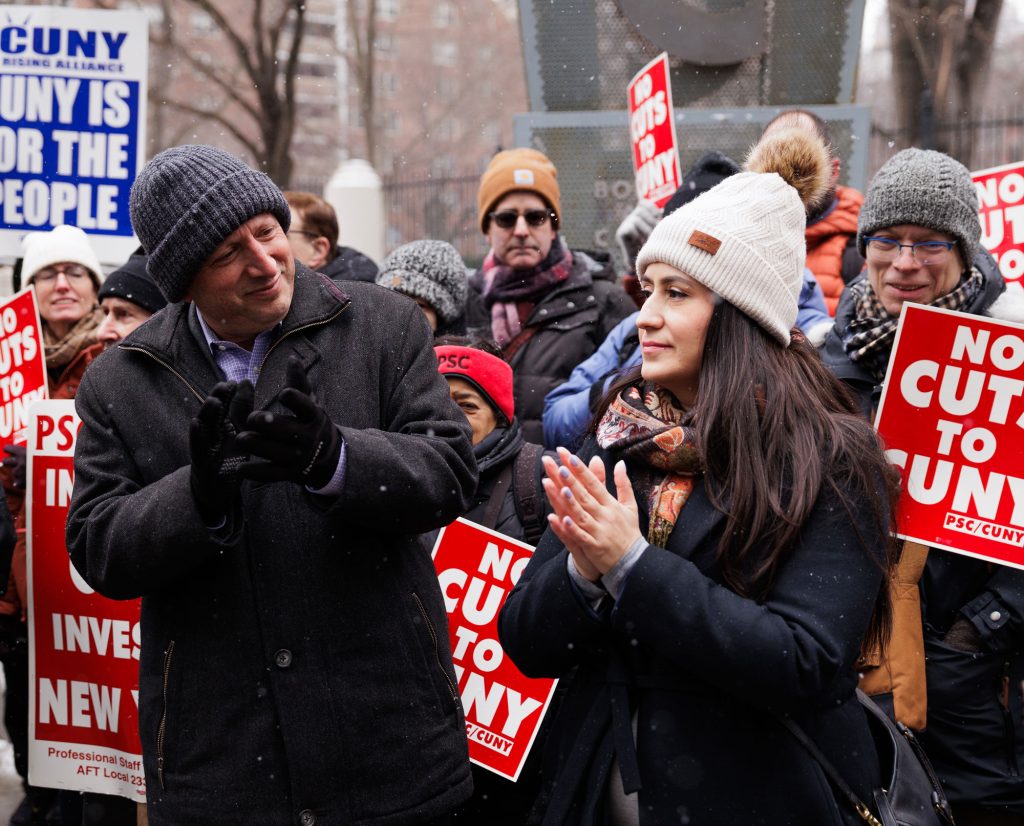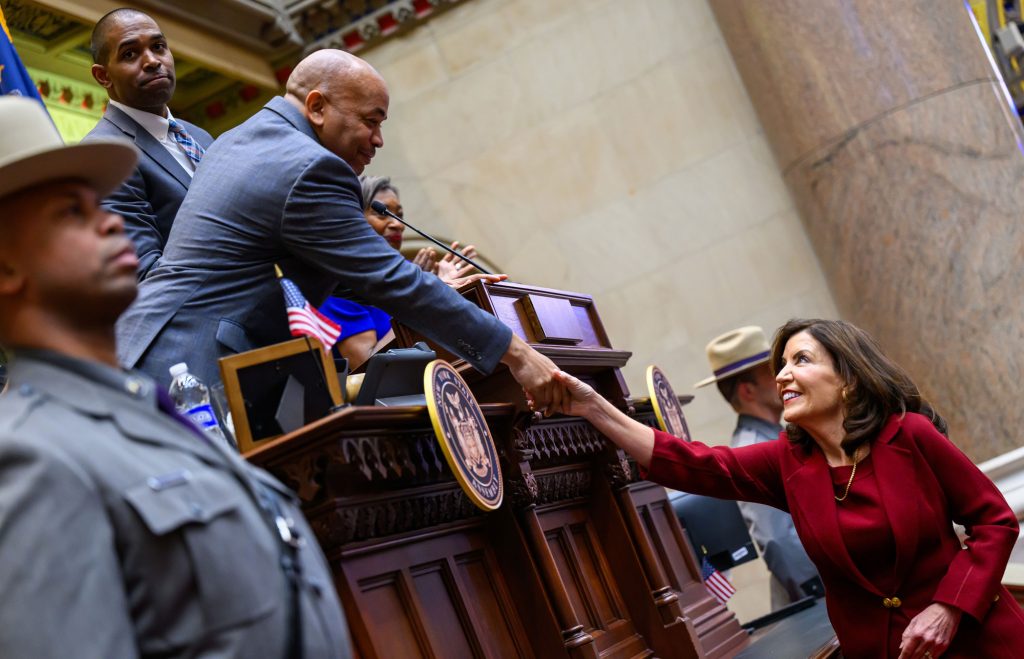
NYC Comptroller Brad Lander and State Senator Jessica Ramos (l to r) rally with PSC members at the Borough of Manhattan Community College to support more CUNY funding. Photo credit: Paul Frangipane
To get an idea of what kind of budgets Governor Kathy Hochul and Mayor Eric Adams are proposing, a good place to start is the editorial page of the New York Post, a semi-official organ of New York’s boss class.
In response to the governor’s budget proposal in January, the Post said her plan “isn’t terrible,” as it includes no new taxes on the wealthy and “calls for slowing the growth in school aid,” but the editorial board worried that Hochul, a centrist Democrat, “fears being rebuffed by prog[ressive] lawmakers.” At the same time, Post columnist Nicole Gelinas fretted that “Hochul will attempt to sustain the unsustainable.”
STATE BUDGET
In other words, the monied classes of the state worry this year’s budget agreement, due this April, will be too progressive. Good – let the residents of the Upper East Side quake. Indeed, for public higher education advocates, Hochul’s budget proposal appears to have an adequate starting point for negotiations, with “$1.5 billion in new capital projects” and “$270 million in new operating support for SUNY and CUNY campuses.” The Albany Times Union summarized the executive budget proposal thusly: “Relatively unchanged funding for higher education after a 17% increase from the prior two years. It includes $106 million for increased funding for university employee benefits and $90 million for general operating support at State University of New York and City University of New York.”
The PSC said in a statement: “We applaud [Hochul’s] new investments in fringe benefits and CUNY operations and funding collective bargaining agreements for our public universities. These are critical investments, though far more state funding is needed.”
At the same time, the governor’s office announced that CUNY is “receiving $75 million from the Simons Foundation, the University’s largest-ever donation,” which “earmarks $50 million to establish CUNY as a hub for computational science and $25 million to support CUNY’s participation in the governor’s proposed Empire AI project.”
FUNDING REALITIES
It’s not all rosy, however. CUNY’s own budget request to the state and city was less ambitious than the one from the previous year. According to a PSC analysis, the enrollment and retention request dropped from $20 million to $6.7 million, facilities maintenance decreased from $30 million to $10 million. The funding request for academic and career advisement fell from $34.1 million to $18.5 million, the analysis showed.
Now let’s look at Mayor Adams, who has already imposed draconian cuts to all city agencies, hurting CUNY’s community colleges acutely. The Post editorial board called the mayor’s budget proposal “surprisingly sunny” and “certainly an improvement over the feckless spend-it-all attitude of the de Blasio years.”
That, by contrast, is a bad sign. “Mayor Adams has turned his back on his alma mater and has given New Yorkers no reason to expect better from him in his preliminary budget,” the PSC said. “Why can’t this mayor recognize that an investment in CUNY is an investment in the future workforce of New York? The fact is, in the last year, enrollment has begun to rebound from the pandemic at almost all CUNY colleges, and the question is what awaits those students who want to pursue their degrees. CUNY is at risk of a twin crisis in student retention and faculty and staff attrition without significant new investments in city and state operating aid.”
NYC Comptroller Brad Lander"While I was grateful to see key programs like Summer Rising and sanitation services restored, critical services, such as CUNY, still face painful cuts, and agency vacancies and attrition continue to jeopardize key city capacities.”
Mayor Adams even had the nerve to deliver his State of the City address at a CUNY campus, Hostos Community College – as activists heckled him, including some who reportedly told him to “fund CUNY.”
The PSC statement continued, “Thanks to the mayor’s budget cuts, years of public disinvestment and CUNY’s overdependence on tuition revenue, CUNY imposed plans on every college to close ‘structural deficits’ totaling $128 million in fiscal year 2024. A freeze on new full-time hires coupled with reductions in budgets for adjunct hiring and other temporary services has led to an understaffing crisis. Now, midway through the academic year, the CUNY administration has demanded even more cuts at nine campuses, including two community colleges, six senior colleges and one professional school. This harms students and staff as hundreds of spring semester classes have been cancelled, enrollment caps on remaining classes have been raised and adjunct faculty and full-time faculty serving on term-limited contracts have lost their positions, their expected income and in some cases their health insurance.”
POLITICAL SUPPORT
The PSC’s allies in elected offices are already speaking out in defense of CUNY and funding for other vital services. NYC Comptroller Brad Lander said in a statement: “I was pleased to see that the mayor increased funding to address some of the fiscal cliffs that my office has previously identified, and that City Hall is not proposing to tap into long-term reserves. Other long-term budget issues, like the growing cost of uniformed overtime and claims against the City, remain unaddressed. While I was grateful to see key programs like Summer Rising and sanitation services restored, critical services, such as CUNY, still face painful cuts, and agency vacancies and attrition continue to jeopardize key city capacities.”

Governor Kathy Hochul (right) must negotiate with Assembly Speaker Carl Heastie (left). Photo credit: Susan Watts/Office of Governor Kathy Hochul
The Adams administration has been devastating for education, both for CUNY and New York City public schools. The United Federation of Teachers is suing the administration over its deep cuts to the city’s schools. The New York Times reported that the mayor “would reverse a small portion of previously announced cuts to New York City’s education budget that would have slashed money for dozens of high-needs schools.” But the damage is still immense – cuts have even forced schools to thin out their lunch options for students.
FIGHT FOR EDUCATION
“There is a big war on children and education happening at City Hall,” said Jessica Ramos, the chair of the state senate’s labor committee. “Education money is sacred. Children’s money is sacred.”
The fight is on for the PSC to secure city and state budget agreements that address CUNY’s needs. The governor will negotiate with the state assembly and senate in February and March until a budget is reached, while the mayor and the City Council, led by Council Speaker Adrienne Adams, must come to a final agreement by the summer.
This means the PSC will be mobilizing. PSC members and CUNY students will travel to Albany to lobby lawmakers, and they will meet locally with state and city lawmakers, pressing them to invest in public higher education.
DEMOCRATIC DOCUMENT
“Both the state and city budgets are public documents that are part of a democratic process, and it’s in the interest of everybody at CUNY, for each and every PSC member, to get involved and agitate around the budgets for the future of CUNY,” said Susan Kang, an associate professor of political science at John Jay College and a member of the PSC Executive Council.
Kang added that the mayor’s austerity budgets are framed around the need to cut spending in order to avert an impending fiscal disaster. But she argued that PSC members shouldn’t buy into the fearmongering. “There’s always more money; these are artificial crises that he manufactures,” she said. “We can’t allow him to do this.”
Published: February 27, 2024

